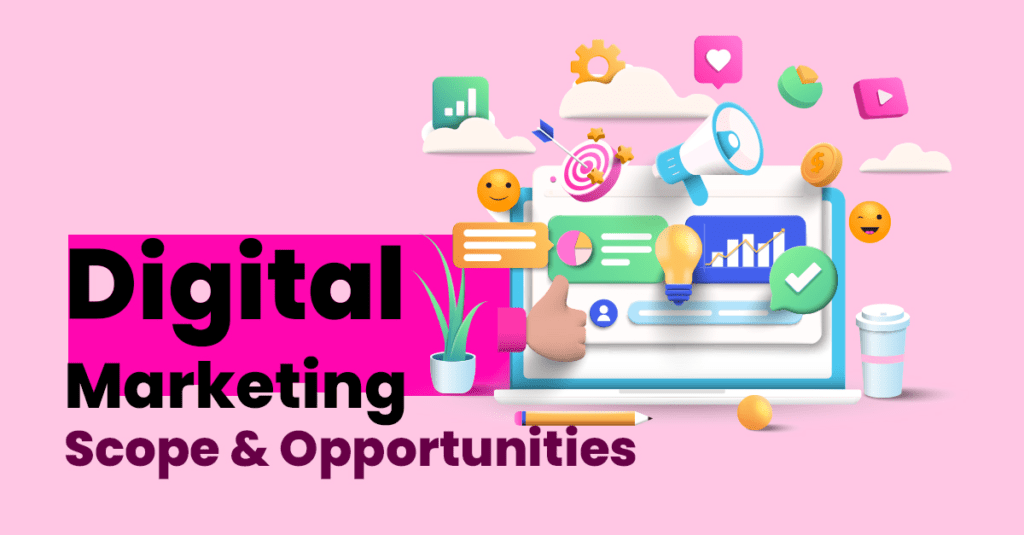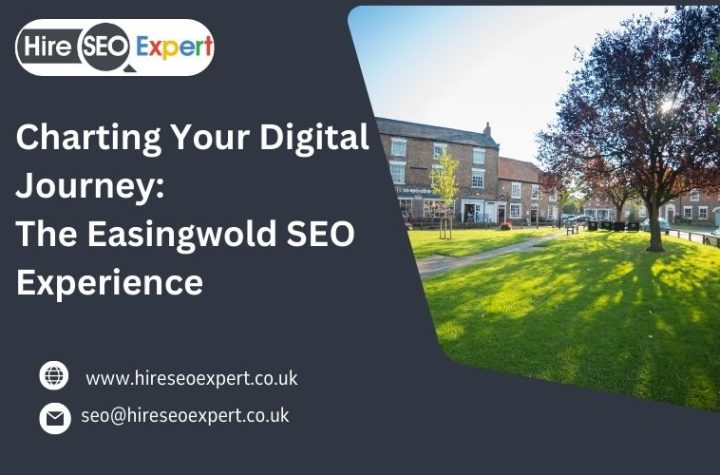
Digital marketing is the practice of promoting and marketing goods, services, or brands via digital channels including search engines, social media, email, mobile devices, and websites. It entails a variety of activities, including advertising, content marketing, email marketing, search engine optimization (SEO), social media marketing, and more. All of these activities are aimed at connecting with customers and promoting brand awareness and sales through digital channels.
Alt-Text: Digital Marketing Scope and Opportunities
Become a Digital Marketing Expert, just by watching our Digital Marketing Course video.
Digital marketing is becoming a crucial part of any marketing plan in the current corporate environment. This is due to the fact that more and more individuals are spending time online and utilizing different digital platforms to conduct informational searches, engage with companies, and make purchases. As a result, companies without a strong online presence are significantly at a disadvantage.
Many advantages of digital marketing for firms include:
More Audience Reach: Because digital marketing enables companies to communicate with individuals all over the world, it gives them access to a considerably broader audience than traditional marketing techniques.
Increased Engagement: Digital marketing offers companies a variety of ways to interact with customers and develop connections, including through social media, email marketing, and content marketing.
Cost-Effective: As digital marketing allows companies to reach a bigger audience for less money, it is frequently more cost-effective than traditional marketing strategies.
Measurable Results: Businesses can track and gauge the success of their marketing initiatives thanks to digital marketing, which enables them to improve their plans and make data-driven decisions.
Overview of digital marketing channels and strategies
The many platforms and techniques used by firms to advertise their goods or services online are known as digital marketing channels. The most well-liked digital marketing avenues and techniques are as follows:
- This entails improving your website’s content to place better in search engine results pages (SERPs) for particular keywords.
- Pay-per-click (PPC) advertising is paying for advertisements to show up on social media platforms or at the top of search engine results pages for particular keywords.
- Using social media sites like Facebook, Twitter, LinkedIn, and Instagram to market your business, interact with consumers, and create leads is known as social media marketing.
- Content marketing is the process of creating and spreading valuable, relevant, and consistent content in order to attract and retain the attention of a target audience and ultimately, encourage profitable consumer activity.
- Sending promotional emails and newsletters to a list of subscribers who have signed in to receive emails from your company is known as email marketing.
- Partnering with influencers to advertise your goods or services to their following is known as influencer marketing.
- Affiliate marketing is working with affiliates who advertise your goods or services on their websites or social media channels in return for a commission.
- To promote your company and interact with your audience, use video marketing, which entails making and distributing videos on social media platforms and video hosting websites like YouTube.
- Using mobile-specific channels like SMS, mobile applications, and mobile-friendly adverts, as well as optimizing your website and content for mobile users, is known as mobile marketing.
- In order to create leads and increase traffic to your website, display advertising entails posting banner adverts on websites operated by other people.
Advantages of Digital Marketing
Increased Reach: With the help of digital marketing, firms may interact with clients from across the world and reach a larger audience.
Targeted Advertising: Digital marketing allows firms to target particular demographics, interests, and behaviors of their target audience, ensuring that the correct people see their advertisements.
Cost-Effectiveness: Businesses may reach a wider audience at a lesser price when using digital marketing, which is frequently more cost-effective than traditional marketing techniques.
Outcomes that are quantifiable: Digital marketing enables companies to monitor and gauge the success of their advertising initiatives, allowing them to make data-driven decisions and enhance their tactics.
Digital Marketing’s limitations:
Information Overload: Because there is so much material online, it can be challenging for businesses to stand out and draw in their target market.
Ad Blocking: Many people install ad-blocking software, which can make it challenging for companies to employ conventional digital advertising to reach their target audience.
Dependency on Technology: Since digital marketing depends on technology, companies must keep abreast of the most recent developments to remain competitive.
Security issues: Businesses need to take action to guarantee that consumer data is safe given the rising frequency of data breaches and cyberattacks.
Career prospects in Digital marketing
- SEO Specialist
- E-commerce Manager
- PPC Specialist
- Content Marketer
- Digital Marketing Manager
- Analytics Manager
Growth of the digital economy
The digital economy is a term used to describe the economic activity that results from billions of everyday online connections among people, businesses, devices, data, and processes. The growth of the digital economy has been significant in recent years, with the proliferation of new technologies and digital platforms. Here are some of the key drivers and trends in the growth of the digital economy:
Increased Internet Connectivity: The global internet user base continues to grow rapidly, with billions of people accessing the internet via mobile devices, tablets, and computers. This has created new opportunities for businesses to reach and engage with customers online.
Expansion of E-commerce: The rise of e-commerce has transformed the retail industry, enabling consumers to shop from anywhere at any time. This has led to the emergence of new business models and opportunities for entrepreneurs and small businesses.
Advancements in Technology: The growth of the digital economy has been fueled by advancements in technologies such as cloud computing, artificial intelligence, and the Internet of Things (IoT), which have enabled businesses to innovate and create new products and services.
Digitalization of Business Processes: The use of digital technologies has transformed how businesses operate, with many traditional business processes now being digitized. This has led to increased efficiency, productivity, and cost savings for businesses.
Social Media and Influencer Marketing: Social media platforms have become a key channel for businesses to reach and engage with customers. The rise of influencer marketing has also created new opportunities for businesses to connect with audiences and build brand awareness.
Data Analytics: The growth of the digital economy has led to an explosion of data, which has created new opportunities for businesses to leverage data analytics to gain insights into customer behavior, operations, and drive growth.




More Stories
Buy Best Bulletproof VPS Email Server | Time4Servers Technologies
SEO Content Trends 2024: Crafting Human-Algorithm-Friendly Content
Crack the Code to Online Success: Exploring Chester’s SEO Agency